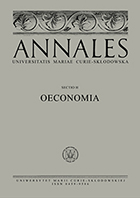Wyniki gospodarcze Szwecji w latach 2000–2013 a problem wprowadzenia euro
Sweden’s economic outcomes in 2000–2013 and the euro adoption problem
Author(s): Magdalena Kakol, Bogumiła Mucha-LeszkoSubject(s): Economy, National Economy
Published by: Wydawnictwo Naukowe Uniwersytetu Marii Curie-Sklodowskiej
Keywords: Sweden; monetary union; benefits and costs
Summary/Abstract: The purpose of this study is to analyze and assess the main macroeconomic indicators of Sweden in 2000–2013 by reference to the corresponding quantities characterizing the economies of Denmark and Great Britain, i.e. countries that have not adopted the single currency as well as Finland and Germany, the most efficient economies in the euro zone. Taking into account the rates of GDP growth and inflation, government balance, public debt and current account balance, or even unemployment rate, it can be concluded that in the analyzed period Sweden was achieving the best economic outcomes, which was particularly evident during and after the crisis 2008–2009. Such excellent performance of the Swedish economy was mainly the result of outstanding macroeconomic policy conducted by this country involving a combination of both fiscal and monetary instruments in order to support economic growth, which would not be possible if Sweden was in the monetary union.
Journal: Annales Universitatis Mariae Curie-Skłodowska, Sectio H Oeconomia
- Issue Year: XLIX/2015
- Issue No: 1
- Page Range: 113-125
- Page Count: 13
- Language: Polish

